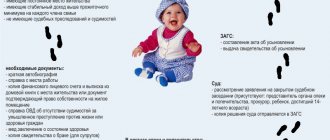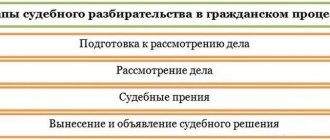A child has the right to express his opinion when resolving any family issues that affect his interests, regardless of his age. In addition, children may be heard in court proceedings. These rights are enshrined in Article 57 of the Family Code of the Russian Federation.
However, in practice, this does not mean at all that if parents divorce, the children must also be taken to court. Today we will talk about in what cases during divorce the child’s opinion will be taken into account and how his age affects this.
At what age does a child’s opinion take into account in a divorce?
According to the general rule established by Art. 57 of the RF IC, the child’s opinion in court proceedings regarding determining the place of residence of a minor is taken into account from the age of ten. Young children are not allowed to participate in court hearings.
During the trial, the plaintiff or defendant has the right to file a petition for a psychological examination of the child’s attachments to his parents. In this case, an expert is involved in the case, who, within the time established by the court, conducts conversations with the child, gives the child tests and asks questions of interest. Meetings with a specialist are carried out both in the presence of one or both parents, and without their presence.
Based on the research, the psychologist draws conclusions about the child’s attachment to each of the parents, declares what decision would be the best solution for the child and draws up the corresponding expert opinion.
If necessary, a psychologist may be called to a court hearing to testify and explain the expert opinion.
The participation of a psychologist is mandatory if the statement of claim to determine the place of residence of a child concerns a minor who has reached the age of 10 years but has mental disabilities. The opinion of such a child is not taken into account; a psychologist, as well as guardianship and trusteeship authorities, are involved in the process.
The child’s psychological attachment to his mother and father is taken into account, as well as the parents’ ability to provide proper care for their special child.
What does the law say?
The central norm in this case is Article 57 of the Family Code of the Russian Federation:
The child has the right to express his opinion when resolving any issue in the family that affects his interests
and to be heard in any judicial or administrative proceedings.
Taking into account the opinion of a child who has reached the age of ten years
, is obligatory, except in cases where it is contrary to his interests.
In cases provided for by this Code (Articles 59, 72, 132, 134, 136, 143, 145), the guardianship and trusteeship authorities or the court can make a decision only with the consent of the child
who has reached the age of ten years.
The article is formulated in such a way that any child has the right to express his opinion, but if the child is under 10 years old, then the court, at its own discretion, can take this opinion into account or not.
RF IC, Article 57. The child’s right to express his opinion
The child has the right to express his opinion when deciding any issue in the family that affects his interests, as well as to be heard during any judicial or administrative proceedings. Taking into account the opinion of a child who has reached the age of ten is mandatory, except in cases where this is contrary to his interests. In cases provided for by this Code (Articles 59, 72, 132, 134, 136, 143, 145), the guardianship and trusteeship authorities or the court can make a decision only with the consent of a child who has reached the age of ten years.
Commentary on Article 57 of the RF IC
Article 57 of the RF IC, giving a child the right to express his opinion when deciding in the family any issue affecting his interests, as well as to be heard during any judicial or administrative proceedings, shows that, despite complete dependence on parents, limited legal capacity, he recognizes each child as a full member of our society and, although not yet fully formed, as a separate person deserving respect.
At first glance, the norm of the commented article looks contradictory, establishing that it is mandatory to take into account the opinion of a child who has reached the age of 10, except in cases where this conflicts with his interests. It would seem that an opinion is always a direct expression of an individual’s interests, and who else but the individual himself, the bearer of certain needs and interests, can know about his needs better than anyone else? However, in reality there is no contradiction here. Firstly, by granting a child with limited legal capacity from the age of 6 years, the state shows that it does not yet trust the child to make decisions independently and express them in actions that have legal significance. After all, legal capacity presupposes the ability to understand the meaning of one’s actions, manage them and foresee their consequences, which becomes possible, according to sociological and psychological research, only upon reaching 18 years of age.
Secondly, establishing the norm of Art. 56 of the RF IC, that it is the parents who express and protect the rights and legitimate interests of the child, the state also shows that it does not yet trust the child to independently carry out such actions and puts the opinion of the parents, in general, above the opinion of the child himself.
Thirdly, the state does not proceed from the abstract absolute of the interests of the child when protecting his interests, but from the priority for him of generally recognized benefits, such as health, a full-fledged education, psychological comfort and material well-being. And, as we all know, in childhood, concepts of good can be significantly distorted under the influence of momentary desires.
Thus, this norm makes it clear that the state provides the child with the right to vote and, if his interests coincide with those that are socially recognized and necessary for him, parents (or persons replacing them) are obliged to take them into account. However, the last word still remains with them if the desires expressed by the child, representing his personal interests, do not correspond to generally accepted benefits.
It should also be noted that the obligation to take into account the opinion does not mean that in controversial situations it is necessary to completely accept the child’s position. Taking into account opinions means that parents must, to one degree or another, adjust their position taking into account the child’s opinion, i.e. come to some kind of compromise.
However, despite the fact that the last word in general does not rest with the child, but only his opinion is taken into account, there are cases in which the word of the child, provided he reaches the age of 10 years, is decisive (Articles 59, 72, 132, 134 , 136, 143, 145 of the commented Law).
These are cases such as:
- changing the child's first and last name;
- restoration of parents' parental rights;
- consent of the adopted child to adoption;
- changing the surname, name and patronymic of the adopted child;
- registration of adoptive parents as parents of an adopted child;
- resolving the issue of preserving for the child the first name, patronymic and last name assigned to him in connection with his adoption when the adoption is cancelled;
- resolving the issue of placing a child under guardianship or trusteeship;
- appointment of a guardian for a child who has reached the age of 10 years.
Is the child’s opinion taken into account during a divorce through the registry office?
According to the norms of the RF IC, divorce in the registry office is possible only in the absence of children. Even if the spouses have no disputes, but there is a minor child, you need to go to court.
Another situation is possible - creating a family with a parent who has a child from a previous marriage. In fact, a spouse who is not biologically related to him has no rights to him (except for subsequent adoption). In this case, the opinion of the minor will not be taken into account in court, and the place of residence will not have to be determined - he will remain with his natural mother or father, even if he is strongly attached to his wife, from whom he is divorcing.
On what issues can a child express his or her position?
Judging by Art. 57 of the RF IC, a minor has every right to express his own position on any family issue that concerns his interests.
In addition, the child is required to be heard not only at the “family council”, but also in court. In this case, the type of proceedings does not matter - the opinion is taken into account both when parents divorce, and when restoring the rights of a parent, and when adopting.
However, the main issue, in the resolution of which the opinion of children is a significant factor, is still the determination of their place of residence.
How do courts apply the rule?
In judicial practice, there is an approach where a survey of a child under the age of 10 was conducted by employees of the guardianship and trusteeship authorities as part of an examination of living conditions and was reflected in the conclusion of the case.
1) Appeal ruling of the Moscow City Court dated March 10, 2015 in case No. 33-7216/2015; 2) Appeal ruling of the Moscow City Court dated November 14, 2017 in case No. 33-34754/2017
Since this procedure is not directly regulated for guardianship employees, there is a risk that the child may not be interviewed and his opinion may not be known.
How to interview a child under 10 years old?
If you want your child to express his opinion, you can submit a written request to the court. In this petition, ask the court to instruct guardianship officials to find out the child’s opinion regarding the subject of the dispute (place of residence, order of communication).
Recommendation. It is better to submit the petition as substantiated as possible, i.e. explain that the child, despite the fact that he has not yet reached 10 years of age, is well able to formulate his thoughts and is psychologically capable of answering such questions.
Are the opinions of children under 10 taken into account?
If a child is under 10 years of age and the parents are divorcing in court while simultaneously trying to resolve the issue of determining his place of residence with one of them, his opinion will not be fundamental. However, the courts still listen to the arguments of minors, but they are not invited to the hearings.
Representatives of the guardianship authorities can find out the child’s opinion when conducting an inspection of living conditions. At this time, the environment in which the parents live is studied and a conversation is held with the children. Everything is recorded in a document submitted to the court.
There is a second option - the court appoints a psychological examination on the initiative of one of the parents. During it, psychologists work with the child and find out which of the divorcing spouses he is more attached to.
How is the examination carried out?
The appointment of a comprehensive psychological and psychiatric examination is carried out by court decision.
How it all looks step by step:
- The mother or father submits a request for an examination.
- The judge creates a list of questions that experts must answer in their conclusion.
- A court ruling is drawn up and sent to an expert organization with state accreditation.
- During the conversation, the specialist talks to the parents, then conducts a survey of the minor.
Based on the results, the specialist finds out to whom the child is more attached, his psychological state, what conflicts there were previously in the family and with whom it is better for the minor to stay.
Important! The decision is not made on the basis of the conclusion alone. It is issued after a detailed study of the circumstances in the complex.
Examination to establish a child's attachment
A psychological examination, which helps determine the child’s attitude towards both parents, is carried out by a psychologist who interviews the child:
- Which parent spends more time with the child?
- What are your child’s favorite games and how does he spend his leisure time with his family?
- Does he attend sections and who exactly is involved in his physical and spiritual education?
- Is there aggression in the family and from which parent is it manifested?
- What methods of punishment are used?
- How does the child relate to each parent individually and to both together?
- Which parent misses you more in their absence?
- Which second-degree relatives take part in raising the child: from the mother’s or the father’s side? How does the child relate to each of them?
- Who is the child’s authority figure in the family circle?
- Are there problems with alcohol in the family, and what is the child’s attitude towards this?
- Do parents exert pressure and impose their opinion on the child regarding the place of residence?
In conclusion, the psychologist draws a conclusion regarding the psychotype of the child himself, as well as his ability to adequately accept the situation and express his own opinion in relation to both parents.
Some data may be falsified when one of the parents forces the child to take their side and present false information. This usually manifests itself in confusion of testimony, as well as expression of thoughts in a verbal form that is not typical for a child of his age.
If the court has doubts about the examination, a repeat procedure may be ordered.
Can the court refuse a divorce if the child is against it?
Often children try to “force” their parents to keep the family together, saying that they do not want them to divorce.
However, the court cannot take into account the child’s opinion on divorce: according to Art. 16 of the RF IC, a marriage can be terminated at the request of one or both spouses. The only case when the opinion of a minor over 10 years of age is taken into account without fail is when resolving the issue of leaving him with his mother or father simultaneously with the divorce process or after it.
Court decision to live with one of the parents contrary to the child’s opinion
Despite the fact that the judgment of children who have reached the age of ten must be taken into account in one way or another when determining their place of further residence, this factor cannot be decisive. The court decides with whom the minor will live, primarily based on his interests .
The court, listening to the child’s opinion about his future place of residence, takes into account that the desire may be based on pity for the parent or the gentleness of one spouse in choosing methods of education. Therefore, a court decision may be made contrary to the wishes expressed by the minor.
An important, but not the only indicator, is the material security of the spouses. The court will also pay attention to the ability to devote the necessary time to parenting (for example, to the work schedule of each spouse). An equally important circumstance will be the moral qualities of the parents and other factors.
Is it possible to determine a child’s place of residence without a trial?
Parents can avoid proceedings and draw up an agreement to determine the place of residence of their son or daughter (Article 65 of the RF IC). The absence of disagreements on this issue and the desire to resolve everything peacefully is enough.
Legal advice: the agreement does not require notarization, but it is better to have it drawn up by a notary. The presence of his seal and signature will significantly reduce the chances of challenge if problematic situations arise in the future.
Let's consider how to properly draw up an agreement and what is required for this.
Procedure for drawing up an agreement
To resolve the issue of a child’s residence by agreement, it is enough to follow several steps:
- Decide who the minor will stay with, what communication procedure to establish for the second parent living separately.
- Draw up two copies of the agreement, indicating all the details.
Important! If the document is certified by a notary, the signing takes place in his presence.
Sample agreement
The agreement must provide comprehensive information:
- FULL NAME. parties, passport details, residential address;
- Full name, date of birth of the minor, details of the certificate;
- The purpose of the document is to determine the place of residence with one of the parents (the specific spouse with whom the child remains is indicated);
- The procedure for exercising parental rights: when a party living separately can see a son or daughter, what rights does he have;
- Rights and obligations of the parties;
- Grounds for changing or terminating the agreement;
- Validity period of the document;
- Signatures of the parties.
The agreement is drawn up in two copies. One stays with the mother, the second with the father.
Sample agreement on determining the place of residence of a child and the exercise of parental rights in relation to him: alt: Agreement on determining the place of residence of a child and the exercise of parental rights in relation to him
Documentation
To draw up an agreement, it is enough to have with you:
- Passports of both parents;
- Passport of a child over 14 years old;
- Birth certificate of a child under 14 years of age.
If the parties contact a notary, a receipt for payment of the notary fee will be required.
State duty
When notarizing an agreement, it is not the state duty that is paid, but the notarial fee established by Art. 22.1 “Fundamentals of legislation on notaries.” You will have to pay 500 rubles for certification of the document.
Note! The price includes only the certificate of agreement. If parents want a notary to draw it up from scratch, they will have to pay an additional 5-7,000 rubles. The exact price of the service is set independently by the notary chambers of each region.
How to take your child's opinion into account
A PLO officer must be present at the trial, and even before the start, the judge is obliged to consult with him. This is necessary in order to make sure that the question of choosing a parent will not cause serious psychological trauma to the child. Children, due to their age, cannot understand why dad and mom should live separately; they do not know the difficulties in the relationship between parents, especially when they never argue (scandal) in the presence of children.
A small child (under 10 years old) is not required to be present at the divorce. The conversation takes place on neutral territory in a complacent atmosphere, in no way connected with the gloomy official courtrooms. Parents are also absent so that they cannot indirectly influence the outcome of the interview through manipulation.
The psychologist asks leading questions, never directly, but only conditionally neutral ones, but allowing one to understand to whom the child is personally drawn more. How does he assess the situation at home, does he have any reluctance to stay in a common house or does the child feel comfortable with his grandmother. According to paragraph 20 of the PP of the Supreme Court No. 10 of May 27, 1998, the court must establish how aware the child is of his own interests, what justifications he may have for choosing who to stay with - mom or dad.
Arbitrage practice
Most often, children are left with their mothers, and the order of communication in relation to fathers is determined. The opinion of a child over 10 years of age is taken into account, but due to limited legal capacity, it does not always become fundamental for an objective consideration of the case.
Example:
The couple is getting a divorce in the district court, and at the same time the issue of leaving the son with one of the parents is being decided. The mother wants to take him for herself, but the father is against it. The child is 12 years old and claims that he does not want to stay with her due to his strict upbringing. His father allows him everything, never swears, there are no scandals.
During the proceedings, it turned out that by strict upbringing, the son meant his mother’s demands to do his homework every day, not sit at the computer for a long time, and try to study well. The father was never interested in the child’s education, but a couple of times a month he went for walks and fishing with him.
Based on the results of the proceedings, the court sided with the mother, considering that the minor would be better off with her.
If the child claims that he feels uncomfortable with one of the parents due to psychological incompatibility, abuse, and indicates a desire to stay with the other, the court will take his opinion into account.
Let's look at a few examples of court decisions:
- Decision No. 2-2956/2019 2-2956/2019~M-2056/2019 M-2056/2019 dated June 24, 2021 in case No. 2-2956/2019;
- Decision No. 2-1340/2019 dated June 26, 2021 in case No. 2-1340/2019;
- Decision No. 2-1741/2019 2-1741/2019~M-1261/2019 M-1261/2019 dated June 27, 2021 in case No. 2-1741/2019.
Who is considered a child?
According to Art. 1 of the Law of the Federation “On Basic Guarantees of the Rights of the Child in the Russian Federation”, as well as Art. 54 paragraph 1 of the “Family Code” of the Russian Federation, a child is considered a person who is under 18 years of age.
Children of different ages belong to different categories. Depending on the category, both children and their parents (or persons who replace them), the legislation of the Russian Federation provides different rights and obligations.
A child between the ages of zero and 14 years is considered both a minor and a minor.
A child between 14 and 18 years old is considered to be a minor. From this age, the child is obliged to be responsible for his actions, since at the age of fourteen he (as stated in Article 20, paragraph 2 of the Criminal Code of the Russian Federation) bears criminal liability for part of his actions, namely murder under Art. 105 of the Criminal Code of the Russian Federation, kidnapping under Art. 126 of the Criminal Code of the Russian Federation, sexual violence (Articles 131 and 132 of the Criminal Code of the Russian Federation), theft of a vehicle (Article 166 of the Criminal Code of the Russian Federation), committing a terrorist act and taking hostages under Art. Art. 205 and 206, theft and extortion of weapons and drugs (Articles 226 and 229 of the Criminal Code of the Russian Federation), etc.
Full criminal responsibility begins at 16 years of age.
Until a child reaches the age of 14, parents or persons replacing them bear full responsibility for their actions.
Chapter 11. RIGHTS OF MINOR CHILDREN
At what age is the child’s opinion the main one for resolving issues of his life activity?
A minor who has not reached the age of 10 is also compulsorily interviewed, however, taking into account the opinion in this case is not necessary (paragraph 2, paragraph 4 of the Resolution of the Plenum of the Armed Forces of the Russian Federation No. 44 of November 14, 2021 “On practice ..."). The court independently decides whether to take into account the point of view of a minor under 10 years old or not.
From what age is the child’s opinion the main one for resolving issues of his life? The right to know one’s parents is directly related to the right to live and be raised in a family. According to Art. 7 of the Convention on the Rights of the Child, every child has the right to know his parents to the greatest extent possible. If a child is raised in a full-fledged family, then no difficulties arise. The situation is different if the child has been found or is being raised by the mother and the father is unknown. To this day, the question remains open about whether the secrecy of adoption and the secrecy of the biological origin of a child when using artificial insemination methods correspond to the child’s right to know his parents.







